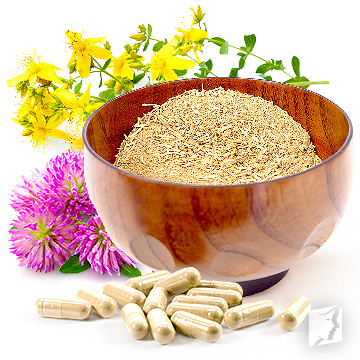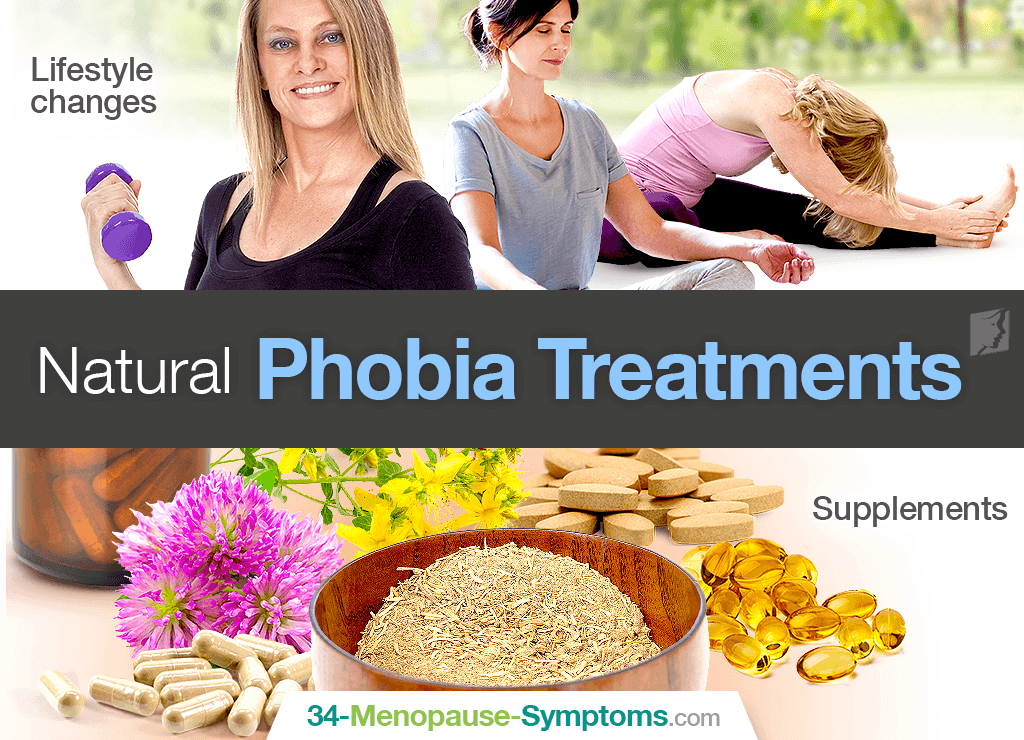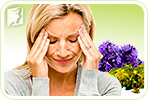The word phobia refers to a group of anxiety symptoms that are triggered by certain situations or objects. While it is common for some phobias to develop during childhood and adolescence, it is possible for them to also arise unexpectedly, such as during the menopausal transition.
Continue reading to learn more about what you can do to treat phobias naturally and medically to finally live a fear-free life.
Natural Phobia Treatments
Natural phobia treatments begin with identifying the specific type of anxiety disorder experienced in order to best manage its symptoms and learn how to treat the underlying cause. Nevertheless, the following lifestyle changes and supplements could help you to improve.
Lifestyle Changes
Learning how to endure anxiety and decrease avoidance behaviors may start with implementing mindfulness tactics. Mindfulness teaches you to live in the present without dwelling on the past or worrying about what could happen in the future. By doing so, you are teaching yourself not to act instinctively, which is driven by past emotions.
Adding in some physical exercise into your daily routine can also help you naturally treat phobias and any induced anxiety. Research has proven that regular exercise elevates mood, improves sleep, and decreases overall levels of tension. Those who are physically active are also statistically less anxious than sedentary people.
Also, employing relaxation techniques - such as yoga, meditation, or progressive muscle relaxation - can be beneficial in treating phobias. These, like mindfulness techniques, bring you into the present moment, in which there are no past or future concerns.
Supplements

Aside from lifestyle changes, various supplements are also renowned for helping reduce anxiety levels and treat phobias naturally.
For example, research has shown that people with diagnosed anxiety have benefited from the consumption of fish oil, which is a good source of essential fatty acids and promotes healthy brain and nervous tissue. It has been shown to calm the adrenal system during times of anxiety and stress.
Probiotic supplements are also renowned for anxiety relief. There is a close tie between digestive function and mood balance. It has been shown that a healthy digestive tract nourished with probiotic bacteria - or “good” bacteria - activates central nervous system signaling systems. By stabilizing the gastrointestinal flora, this reduces depression and other mental health issues.
Finally, menopausal women suffering from anxiety and phobias may choose to address the root cause of the issue, hormonal imbalance. In this instance, hormone-regulating supplements, such as Macafem, are one of the best options as they nourish the endocrine system, thus balancing hormonal levels and decreasing anxiety. Phytoestrogenic supplements - like St. John's wort, kava, and red clover - have also been used traditionally to fill the hormonal gap and relieve symptoms of anxiety.
Medical Phobia Treatments
There are a variety of treatment options available for women suffering from anxiety and phobias. The best one will depend upon her unique case.
Psychotherapy
For women who are suffering from specific phobias, exposure therapy may be implemented to focus on changing her response to the object or situation generating internal fear. The goal is for steady, recurrent contact with the anxiety-inducing stimuli while acknowledging any provoked feelings to ultimately help manage the phobia.
Cognitive behavioral therapy (CBT) is another form of psychotherapy used to help women manage specific phobias. This method urges women to learn ways to cope with the fear differently by combining exposure with alternative sensations and beliefs. In this way, she will be able to develop a sense of self-confidence and control concerning her thoughts instead of being overwhelmed by them.
Medications
Finally, although psychotherapy methods are generally successful in treating phobias, sometimes the use of medications may be necessary to reduce anxiety and panic.
Beta blockers are used widely as a medical phobia treatment. These medications block stimulating effects of adrenaline, including a pounding heart, elevated blood pressure, shaking limbs, and increased heart rate. These are all caused by anxiety and phobias.
Also, sedatives - a class of medications known as benzodiazepines - may be used to help women decrease the amount of anxiety they feel when faced with their phobia. These are used with caution as they're extremely addictive.
For women going through the menopausal transition, hormone replacement therapy (HRT) is used to treat anxiety and phobias by replacing the depleted body-made hormones with exogenous hormones. This phobia treatment method should also be taken with caution as it is linked with serious side effects.
Key Takeaways
All in all, there are numerous treatment options available for women suffering from anxiety and phobias. Natural treatments focus on lifestyle changes that move a woman's focus to the present - mindfulness and relaxation techniques - and get her up and moving with regular, physical exercise as well as hormonal balance, with hormone-regulating and phytoestrogenic supplements. Medical treatments focus on undergoing psychotherapy with your mental health professional or taking medications, such as beta blockers or sedatives.
However, rest assured that no matter your fear, you are not alone, and more help is just a click away. Discover more about phobia and anxiety treatments, and join the millions more that are taking their mental health into their own hands.
Sources
- Anxiety and Depression Association of America. (n.d.). Specific Phobias | Exercise for Stress and Anxiety. Retrieved October 2, 2018, from https://adaa.org/understanding-anxiety/specific-phobias | https://adaa.org/living-with-anxiety/managing-anxiety/exercise-stress-and-anxiety
- Anxiety.org. (n.d.). Facts about the effects of mindfulness. Retrieved October 2, 2018, from https://www.anxiety.org/can-mindfulness-help-reduce-anxiety
- Bongiorno, P.B. (2015). Holistic Solutions for Anxiety & Depression in Therapy: Combining Natural Remedies with Conventional Care. New York: W.W. Nortion & Company, Inc. Available from Google Books.
- Mayo Clinic. (2016). Specific phobias: Diagnosis & treatment. Retrieved October 2, 2018, from https://www.mayoclinic.org/diseases-conditions/specific-phobias/diagnosis-treatment/drc-20355162
- National Women's Health Network. (2015). Herbs and Phytoestrogens. Retrieved October 2, 2018, from https://nwhn.org/herbs-and-phytoestrogens/
- Women in Balance Institute: National University of Natural Medicine. (n.d.). Vitamins, Supplements & Herbs. Retrieved October 2, 2018, from https://womeninbalance.org/choices-in-therapy/vitamins-supplements-herbs/




